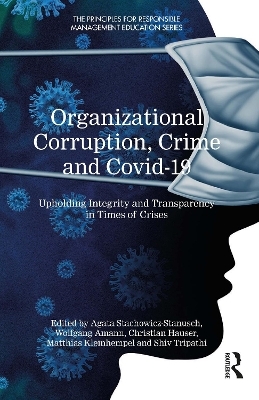
Organizational Corruption, Crime and Covid-19
Routledge (Verlag)
978-1-032-54887-6 (ISBN)
Corruption often flourishes in times of uncertainty and crisis. When institutions and oversight are weak, and public trust low, corruption can thrive and undermine how societies respond to the crisis. Covid-19 brought this issue into sharp focus, and this book uncovers some of the problems experienced across the globe and, crucially, explains how organizations and countries can strengthen their anti-corruption systems to prevent problems in the future.
The book has been created by the members of the United Nations Principles for Responsible Management Education group on anti-corruption and brings together top international experts to consolidate the lessons from the Covid-19 crisis in order to improve transparency, integrity, trust, and governance in the future. Cybersecurity and cybercrime related to the pandemic are a particular focus. These factors are essential to social and economic order. Practice-oriented, each chapter offers examples of methods, approaches, tools, and cases which can be used for anti-corruption teaching, policy, and corporate initiatives.
With insights and cases from right across the globe, the book will be of interest to NGOs, policymakers, organizational leaders, students, and researchers looking to foster accountability, integrity, and transparency across organizations in times of crisis.
Agata Stachowicz-Stanusch is Professor of Management at the Canadian University Dubai. She serves as chair of research in the PRME MENA chapter. Wolfgang Amann is Professor of Strategy and Leadership. He directs degree, custom, and open programmes for HEC Paris in the Middle East. He co-founded the Humanistic Management Network and heads its Middle Eastern chapter. Christian Hauser is Professor of Business Economics and International Management at the Swiss Institute for Entrepreneurship (SIFE) at the University of Applied Sciences, Graubünden. Matthias Kleinhempel is a professor at IAE Business School and its Center for Governance and Transparency, where he teaches at the MBA and executive education programmes. Shiv Tripathi is Vice President at Atmiya University and leads the Humanistic Management Network’s India chapter.
PART I Introduction 1. The virus of corruption during the COVID-19 pandemic PART II The infection of the system by wrongdoing and corruption during the Covid-19 period 2. How stakeholder influence corrupted public leadership in tackling the Covid-19 outbreak in Ischgl 3. Compliance programmes "swabbing" in Argentina: How to achieve consistency with the new standards 4. Is corporate bribery institutionalized in Latin America? Evidence from a comparative study in seven countries 5. Managing the coronavirus pandemic in Russia 6. The pandemic of corruption: Betrayal of trust in crumbling market structures (the case of India) 7. Digitalization and financial inclusion for female entrepreneurs in corrupt countries: Evidence from Southeast Asian countries 8. New information and communication technologies’effectiveness in controlling corruption in emerging and developing countries: Is the "silver bullet" hitting its target? 9. Corporate responses during Covid-19: Evidence from developed and developing countries PART III Recovering after the pandemic: The pathway to strengthening anti-corruption system 10. Education in a post Covid-19 scenario: How artificial intelligence has changed e-learning in the meta era 11. "Ethics drills": How to train your ethical muscle for the (un)foreseeable 12. Leveraging compliance with technology in a post-Covid-19 era 13. Digitalisation, artificial intelligence, and the fight against corruption 14. Beyond rule-based ethics: Learning from Covid-19 to promote a culture of integrity in Mexico 15. Anti-corruption efforts: The importance of the tone at the top PART IV Conclusion 16. Building prosilience for the years ahead: Main insights from the Covid-19 pandemic for the way ahead
| Erscheinungsdatum | 21.09.2024 |
|---|---|
| Reihe/Serie | The Principles for Responsible Management Education Series |
| Zusatzinfo | 12 Tables, black and white; 18 Line drawings, black and white; 18 Illustrations, black and white |
| Verlagsort | London |
| Sprache | englisch |
| Maße | 156 x 234 mm |
| Gewicht | 585 g |
| Themenwelt | Recht / Steuern ► Strafrecht ► Kriminologie |
| Wirtschaft ► Betriebswirtschaft / Management ► Marketing / Vertrieb | |
| Wirtschaft ► Betriebswirtschaft / Management ► Unternehmensführung / Management | |
| Wirtschaft ► Volkswirtschaftslehre | |
| ISBN-10 | 1-032-54887-8 / 1032548878 |
| ISBN-13 | 978-1-032-54887-6 / 9781032548876 |
| Zustand | Neuware |
| Haben Sie eine Frage zum Produkt? |
aus dem Bereich


